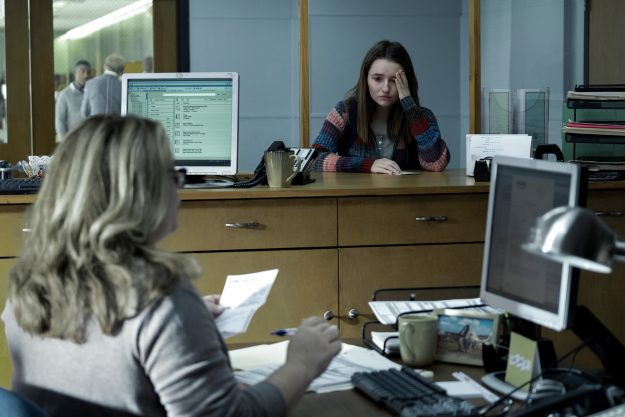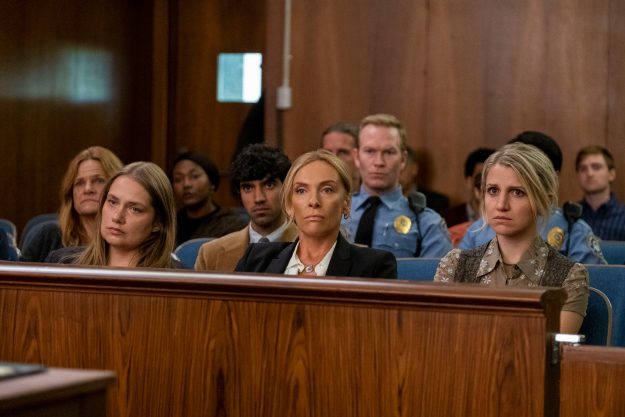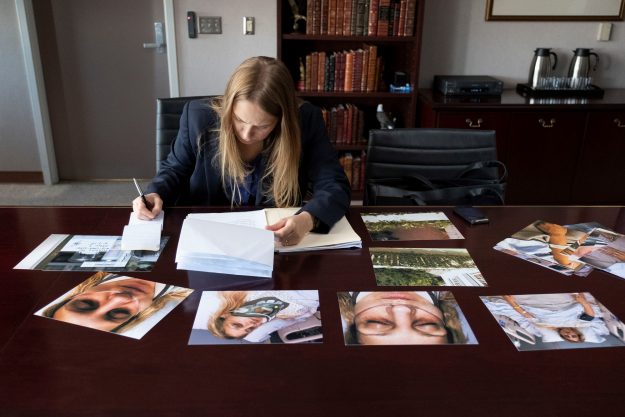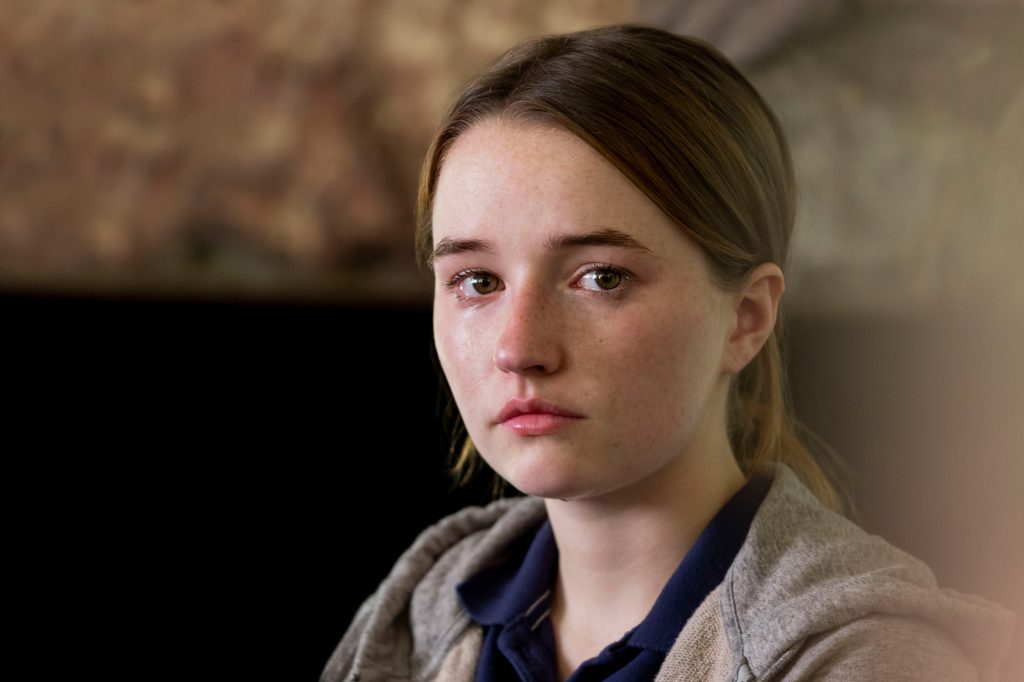‘Inspired by true events, Unbelievable follows investigations of sexual assault and includes depictions of sexual violence. Viewer discretion is advised.” I have of course seen warnings like this before, but seldom if ever have I felt they were used more deservingly. Unbelievable is at times painful to watch—especially in the first of its eight episodes. It is also riveting, unsettling, and illuminating. In its journey through a purgatory of sexualized violence and its aftermath, we are guided by the compassion, determination, bravery, and intelligence of its three remarkable main characters to its just and redemptive conclusion.
Based on the Pulitzer-winning reporting of T. Christian Miller and Ken Armstrong, Unbelievable employs a narrative strategy of telling two alternating stories that as viewers we watch being gradually braided together, even as the protagonists in each story remain, until the final chapter, unaware of the existence of the other. Both storylines examine the consequences of socially pervasive misogyny, especially as it takes the form of violence against women and how that violence is handled in the criminal justice system. Watching the series, I was reminded of something Martin Scorsese said years ago about his film adaptation of Edith Wharton’s The Age of Innocence: That in its portrayal of the baked-in cruelty of the society’s enforcement of its norms, the film was more violent than his bloody gangster movies. The violence in Unbelievable is at times overt, specifically in its depiction of rape, but also, and no less significantly, in its showing of the ways social attitudes conspire to deny, undermine, and reverse blame when women are victims of sexualized violence.
The series opens in Washington state with a young woman, 18-year-old Marie, sitting wrapped in a blanket, shaken and traumatized. A police officer soon enters her room, and asks her to recount the rape she had just reported. As Marie (bravely portrayed by Kaitlyn Dever) speaks, we see, through her eyes, flashbacks of the brutal attack. No sooner does she finish her account than two detectives assigned to the case show up, and they in turn ask that she go over the events once more. Again, there are flashbacks. We thus see the trauma alive in her present moment of telling and retelling her story. The police—all men—are concerned and sympathetic, but they have little if any grasp of the fragility of Marie’s state of mind or of just how difficult it is to relive the rape in each retelling.

The detectives then bring Marie down to their precinct, where she must repeat her account yet again. Then she must tell it once more at her medical exam. Then she must put it down in writing. The testing, while necessary, is invasive and coldly efficient. The questioning of the detectives as they probe Marie for several minor inconsistencies is increasingly invasive as well. And with each telling, Marie’s affect becomes more and more detached.
We have by now learned that Marie had for years, since being removed from her severely abusive family, been bounced around the foster care system. For the previous six months she had for the first time been living on her own. She is young, she is poor, she is emotionally immature, and she is a woman without family support. All of which conspire to leave her weak and vulnerable in the criminal justice system.
Marie’s previous foster mother has reached out to lend support, something she is not good at. The foster mother comes to feel that Marie is not acting as she “should,” which prompts her to talk with the lead detective about her concerns that Marie might be making it all up. Marie seems “fine,” she says. And Marie tends to act out with “look-at-me behavior.” And her story seemed “off.” The detective, having focused on the inconsistencies in Marie’s account, is primed to accept the implication that Marie made it all up. Following this exchange, the investigation flips, and now Marie is its subject.
More interviews, now overtly aggressive, follow. A retraumatized Marie grows increasingly confused and doubtful of her experience and memory. The police corner her, accuse her of lying, and she finally gives up and gives them what they want: Her agreement that there was no rape. She is then charged with false reporting, fined $500, and her case is closed. The story is then leaked to the public, and Marie’s formerly supportive friends turn against her. The episode ends with Marie standing on the ledge of a bridge, desperately considering jumping. For the viewer, it is unbelievable that Marie has been so horribly un-believed.
The second episode opens with Marie stepping back from the ledge to encounter her reality as a pariah. Soon, however, the story shifts. Forward three years to Golden, Colorado, where we meet Detective Karen Duvall (Merritt Wever) as she investigates the rape of Amber, a college student. Now we see how a rape investigation can be properly handled. Karen is thorough and precise in her police work; she is also focused on the needs of the victim. The organization Start by Believing offers concrete suggestions for responding when one is told by a victim of rape, abuse, or harassment:
- Start by believing: “I believe you.” “I’m sorry this happened.” “I am here for you.”
- Be supportive: “You can tell me as much or as little as you want.” “It’s not your fault.” “I’m glad you told me; I’m so proud of you.”
- Ask how you can help: “What can I do to support you? I can stay with you tonight; would that help?” “Do you want me to go with you to the hospital or police station?”
In Karen, we see how these principles can deftly be applied in the context of a police investigation.
As she pursues Amber’s rapist, Karen comes to team up with a detective in a nearby precinct, Grace (Toni Collette), who has a case with similar evidence. (Wever and Collette are both award-winning actors, and they are here in top-notch form.) The two detectives are smart, savvy, determined, and battle-hardened in dealing with the misogyny they regularly encounter as they pursue their cases. In the following episodes, we follow the numerous twists and turns of their investigation. As their work proceeds, it also expands, as they come to recognize the elusive patterns that link not only their two investigations but a number of others in the state.

As Karen and Grace’s procedural unfolds, it alternates with Marie’s very different story. Lacking the clout that Karen and Grace have, Marie is isolated in her struggle to stay afloat. Through no fault of her own, her life has been derailed by a system that is stacked against her. She has been twice victimized and twice traumatized. Despite this, she somehow keeps going, and over time, she starts to fight back. It is not until the final episode, with the conclusion of Karen and Grace’s investigation, that the characters become aware of the connection between the two narrative lines. For the detectives, this brings a surprising new level of closure. For Marie, it brings vindication and poignant release from a long and hellish journey.
Having received a relatively modest settlement from the city, Marie sets out to start over in a new place. But before leaving, she needs to do two things. First, she pays a visit to the lead detective in her case. He clearly feels terrible, as a professional and as a person, about how he treated Marie. He apologizes sincerely. Marie’s response is perfectly simple: “Next time, do better.” Shortly thereafter, Marie calls Karen, who she has never met, to say thank you and to let Karen and Grace know what they mean to her.
“That was the hardest part of this whole thing, waking up feeling, Well, if the world is this bad, then I don’t know if I want to be in it, you know . . . . But then out of nowhere I hear about these two people in a completely other part of the country looking out for me and making things right. And more than anything, more than him getting locked up, more than the money I got, it was hearing that, about you guys. That changed things completely. And I wake up now and I can imagine good things happening.”
And then Marie drives off to take up life anew.
♦
In an interview in Harper’s Bazaar, Unbelievable’s showrunner, Susannah Grant, says she did not want the audience to see the lead detective in Marie’s case as a villain or a horrible person.
He is somebody who is making decisions based on a set of assumptions that a lot of us in our culture hold about what a reliable narrative should sound like and how a victim of rape should behave.
She says the misery the detective inflicts on Marie is not a result of bad intentions.
It’s a systemic problem, a cultural problem, if you look at the numbers: Somewhere between 5 and 20 percent of sexual assaults are ever reported, and then of those, maybe at the most, 5 percent are prosecuted. That’s not a problem of one or two bad detectives. That’s a cultural problem that’s supported by misapprehensions we all must be carrying around with us to allow this to continue. I was more interested in having someone who the audience could relate to, thinking that his mistakes might in some way make the audience complicit with those misjudgments.
This is among the ways that Unbelievable lays bare the insidiousness of rape culture, an interlocking system of beliefs, behaviors, habits, and rules that can infect any social group, large or small. Women who raise their voices against it are often accused of selfishly wanting to inflict individual or institutional harm. We in Western Buddhist communities have for decades seen a lot of this.
I believe this culture of denial and victim-blaming is magnified in religious and spiritual institutions, in part because victims and their supporters often feel they don’t want to cause harm to the organization that has meant so much to them. Like other institutions infected by rape culture, spiritual communities have a vested interest in protecting abusers and blaming, disbelieving, or dismissing those who speak out. Reality is twisted so that the speaking out, rather than the harm caused by abuse, is cast as the problem. So the harm continues. Those who commit abuse, especially if they have a high position in the organization, receive a pass, and victims and their supporters are shunned, isolated, forced out, and so forth. Others, given the painful choice between supporting the victims and being ostracized or remaining silent, opt to ignore or minimize the wrongdoing. Whether they realize it or not, their silence is itself a form of violence.

Having seen these dynamics play out in my own now-former Buddhist community, I fear for the children of families who remain in the kind of organization where a culture of sexual abuse is tolerated and covered over in the name of preserving the Buddhist teachings and the reputation of the tradition. I fear for them not only for the immediate danger they face but also for the attitudes they are internalizing. (And by the way, the teachings don’t need to be preserved out of fear and neurosis; they will continue whether or not a particular organization does. As for the reputation of the organization: By the time those inside become concerned, word is already out.) For the benefit of all, harmful behaviors need to be named and clear boundaries set. Responsible organizations use best practices and expert consultants, and our society has laws about criminal conduct. We should not be so arrogant as to think such standards do not apply to us. If we want our organizations and traditions to be preserved, then it is for us to insist that they protect and defend everyone from harm—even if that harm comes at the hands of our most respected leaders and friends.
In dramatic form, Unbelievable shows the damage we can do when we blindly or stubbornly adhere to habitual patterns that prevent our seeing what’s going on around us. Awakening from misogynist views of sexual abuse is itself a lifelong path, but with humility and a willingness to listen and learn, we may reduce the harm from it we perpetuate in the world. We might even learn to help. Because these views are so deeply entrenched, education and dialogue are keys to awakening. By giving dramatic form to complex true events, Unbelievable affords us just such an educational opportunity. Please don’t turn away.
Thank you for subscribing to Tricycle! As a nonprofit, we depend on readers like you to keep Buddhist teachings and practices widely available.
